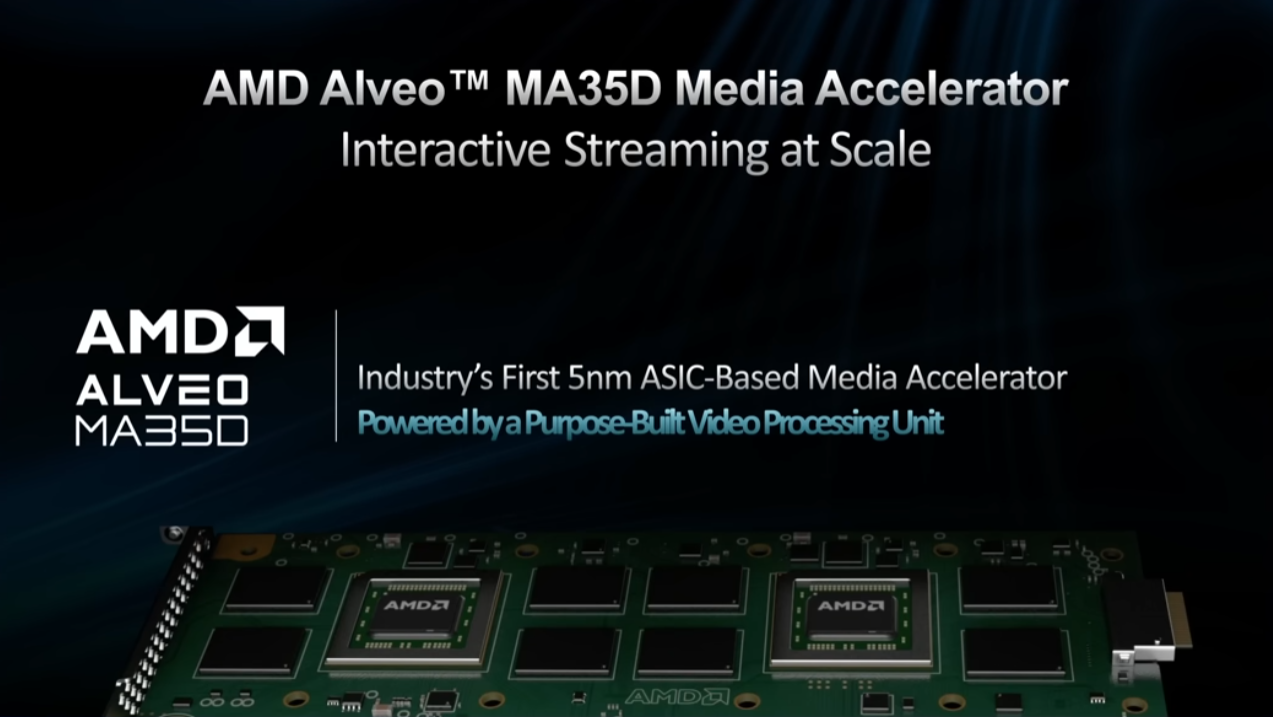AMD Alveo MA35D: The Future of Live Streaming
TL;DR
The Alveo MA35D from AMD is set to revolutionize the live streaming and broadcast industry with its impressive capabilities. Powered by the industry’s first 5nm-based ASIC media accelerators, the card is capable of decoding upwards of 64 1080p60 video streams, encoding 32 1080p60 video streams, and performing remarkable video processing with minimal latency and power consumption.
The card supports decoding for H264, H265, VP9, and AV1, and encoding in H.264, H.265 and AV1. Its innovative ASIC layout includes 4 encoder blocks, with two dedicated solely to AV1. The AI hardware enhances video quality through predictive optimization. It offers the potential for better quality video streams, particularly in a world where AV1 is becoming more common.
While priced at $1595, the cost is not overly burdensome for serious streamers or enthusiasts, considering its robust performance and the potential savings in terms of power and space for data centers. For instance, Twitch could massively scale up their AV1 streaming capacity using this hardware.
The MA35D also holds promise for the future of multi-streaming and individually-hosted video platforms. With the rising popularity of services like Owncast and Peertube, the ability to handle 32 streams makes this card an interesting prospect. In conclusion, the Alveo MA35D has the potential to make AV1 more accessible, enhance video quality, and reshape the live streaming and broadcast industry.
In a major turn of events in the world of live streaming and broadcast industry, we turn our attention away from graphic cards to a smaller, more discrete player. A video card named the Alveo MA35D from AMD, created through their acquisition of Xilinx just a year prior.
What is Alveo MA35D?
The Alveo MA35D is a media accelerator card, built to excel in video decoding, processing, and encoding. This unassuming piece of hardware could have a profound impact on the videos and streams we watch daily.
The Alveo MA35D houses two ASIC-based chips, the industry’s first 5nm-based ASIC media accelerators. These chips allow this card to decode more than 64 1080p60 video streams and encode 32 1080p60 video streams, all while operating at just 35W of power in a half-length, half-height card. These specifications are quite impressive, considering it has a throughput latency of around 2ms for 1080p60 and 8ms for 4K60.
Future-Proof for Streaming
The Alveo MA35D supports decoding for H264, H265, VP9, and AV1 and is capable of encoding in H.264, H.265, and AV1. This capacity means the card is designed for the future, and is set to bring AV1 to numerous places where traditional CPU compute-based encoding struggles.
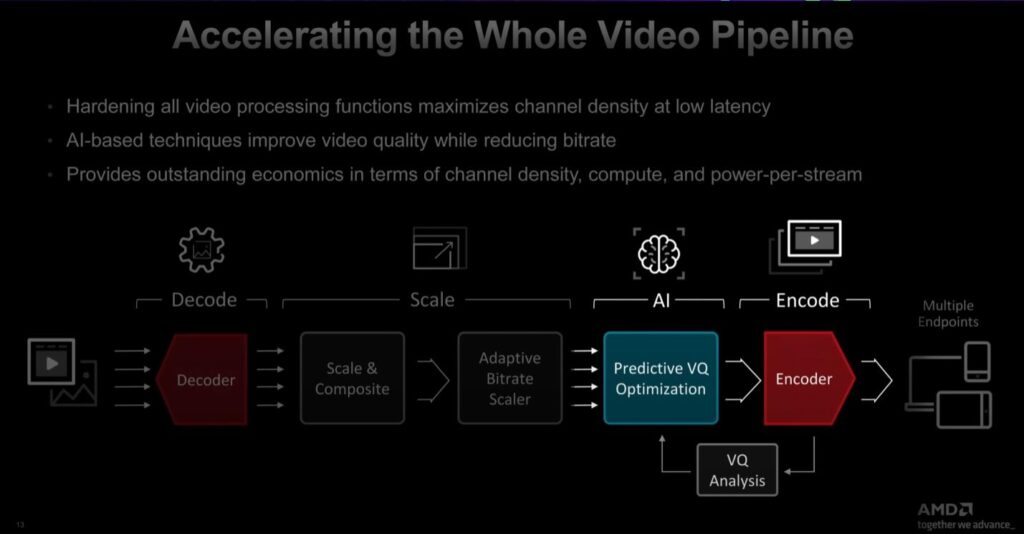
ASIC Layout
The ASICs on the card are arranged interestingly. Each chip has four encoder blocks; two can handle HEVC, H264, and AV1, and two are designed specifically for AV1. The enterprise side is signaling a significant shift towards AV1, and the flexibility of the card allows for a smoother transition during this period.
AV1 Rollout Implications
For instance, if Twitch were to implement AV1 support, they would need to provide a supplementary non-AV1 stream quality for all AV1 streams to accommodate viewers without AV1 supporting hardware. This process would essentially double their encoding workload. With the MA35D, however, this task becomes far more manageable.
Decoder Blocks and Video Processing
Though the decoder blocks might appear small, they can handle double the number of encode streams. This card also has hardware for video processing and scaling, as well as dedicated hardware for compositing video streams, even at 4K. Compositing, which involves layering different elements such as your webcam, gameplay, overlays, and so on, can all be executed on-card, separate from any conventional graphics card. This capability opens up exciting possibilities for both industry-level and individual broadcasts.
Role of the Alveo MA35D in Stream Pipeline
The pipeline for the Alveo MA35D’s use would be to receive video streams from video mixing hardware such as an ATEM, Tricaster, or other high-level equipment. The card can also take in individual video feeds, scale, and composite those sources as needed, then encode that stream to multiple different outputs. This sequence shows the immense potential of the card in the streaming industry. However, there’s one more step that this hardware introduces – AI hardware.
AI Hardware and Predictive Optimization
This AI isn’t like tensor cores. It’s dedicated hardware that AMD can develop applications for to improve video quality through predictive optimization. This technology analyzes the encoded video feed, identifies if bits were allocated most efficiently for the type of content being streamed, and goes back and improves on a second pass. It does all this with just one frame of latency.
Quality and Efficiency
All these features and encoding potential come in a tiny, single-slot card costing only $1595. This price tag might seem high, but considering the encoding capacity of this card, it’s a worthwhile investment. For instance, the dual input 4K60 capture card from Magewell alone costs $1800.
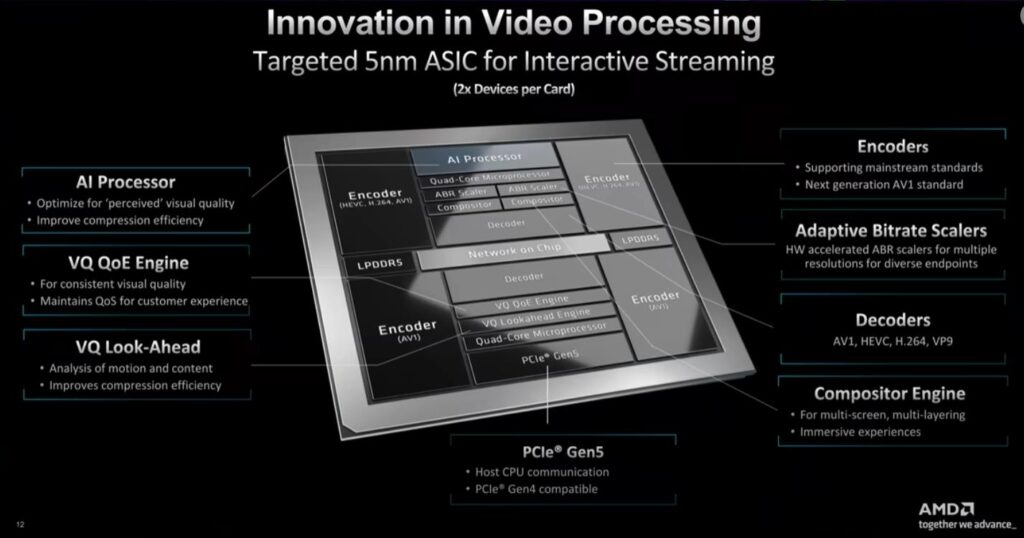
Benefits for Broadcasting and Streaming Industry
Broadcast trucks or racks equipped with tons of video processing and encoding equipment can significantly benefit from the Alveo MA35D. The card offers higher performance with less power draw and heat output. Teams managing regional sports broadcasts, eSports events, and conference broadcasts can do much more for much less with this small but mighty card.
Transforming the Multi-Streaming Landscape
Looking at the future of multi-streaming and individually-hosted video platforms, the MA35D seems to be a game-changer. The rise of services like Owncast and Peertube for running your own video site instances has shown a shift from single-platform enmeshed creators to creators streaming everywhere at once. NVIDIA has been struggling to offer unlocked encoding capabilities on GeForce cards for ages, limiting users to five encode sessions. This new card from AMD, with its capacity to handle 32 streams, becomes an intriguing prospect.
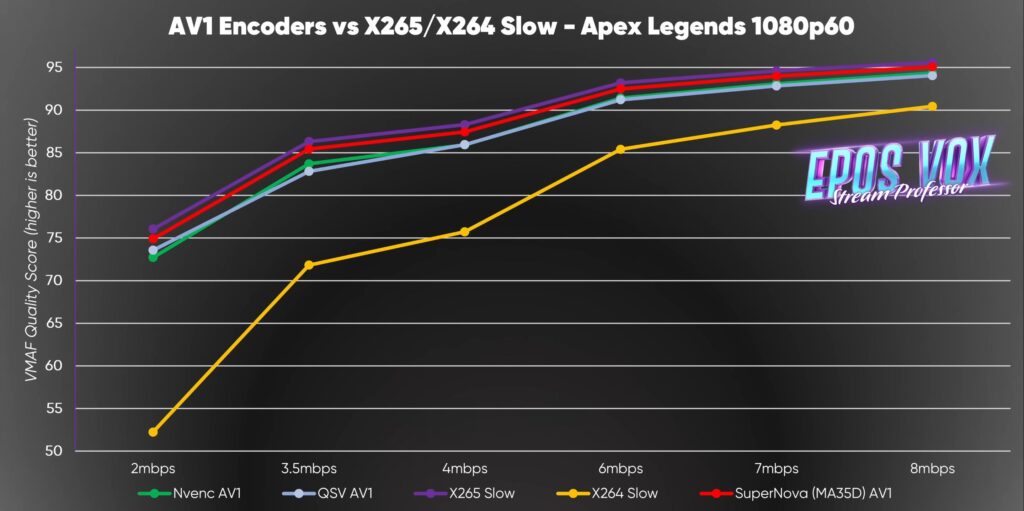
Impacts on Video Streaming Platforms
The Alveo MA35D can have direct and immediate impacts on video platforms. For instance, YouTube recently rolled out AV1 streaming support using Google’s own encoding hardware. These hardware solutions are typically larger, consume more power, and take up more data center space. On the other hand, Twitch relies heavily on X264 CPU encoding with data centers packed with Intel Xeon servers. The MA35D card can handle up to 256 streams in one machine, drawing only 280 watts for the cards, making it an efficient solution both in terms of power and physical space.
Amazon and AV1 Rollouts
Amazon has been deploying the previous Alveo card, the U30, in AWS, and the new MA35D provides 2-4x the power and capacity over the older card. If Twitch is going to hit their 2023 to 2024 roadmap for AV1 rollouts, a card like the MA35D could make that goal more attainable than any other hardware path.
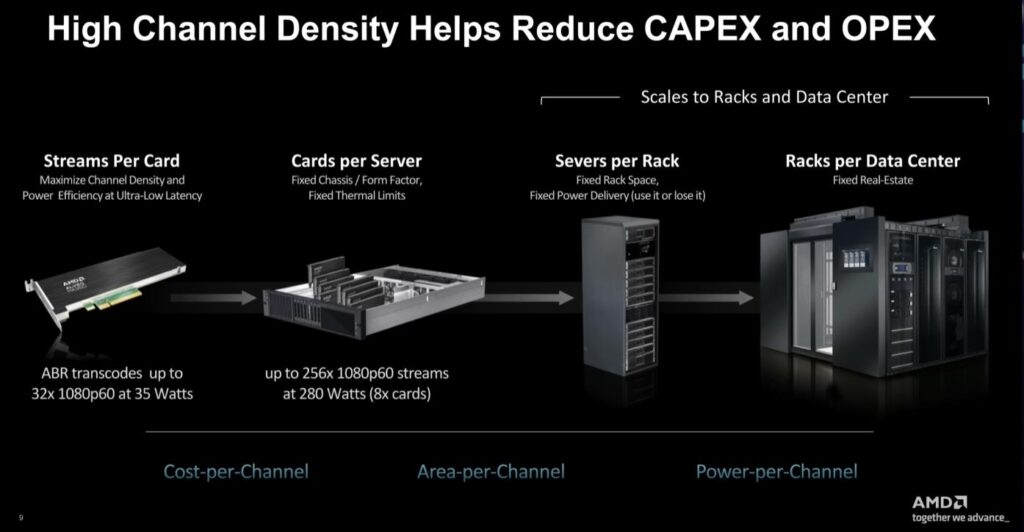
Importance of Video Quality
All this fast encoding wouldn’t mean much if the quality was lacking. However, the MA35D delivers on that front too. AMD’s AV1 encoders compete very strongly with X265 slow, according to their published VMAF numbers. Remember, X265 slow isn’t something you’d typically run in real-time for live streaming.
Verdict
There are many of you watching that would happily fork over the $1595 to use this in your machines right now, though it would be advisable to wait for more software support relevant to this side of the scene to develop. Despite whether you, the viewer, would be buying this card, the fact remains that the MA35D will be changing the streaming and broadcast industry in a major way and will have direct impacts on what you can watch online.

